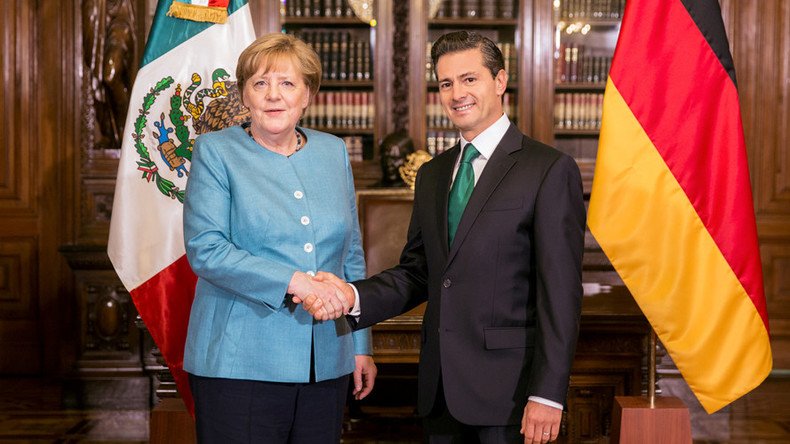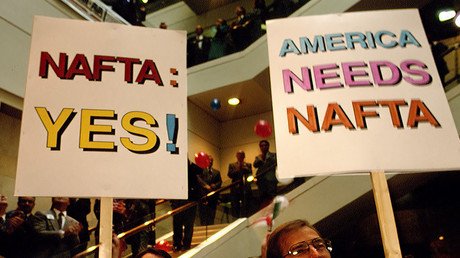'As Trump talks protectionism, Germany looking for piece of giant Mexican pie'

Merkel’s discussion with the Mexican president over NAFTA is an attempt to show Trump that they can cut deals outside the influence of Washington and Wall Street, Abayomi Azikiwe, editor of Pan-African News Wire, says.
German Chancellor Angela Merkel met with Mexican President Enrique Peña Nieto on Friday for discussions on the North American Free Trade Agreement (NAFTA), a Clinton-era trade deal that has been called a “job killer” by US President Donald Trump, who threatened to quit the three-nation agreement.
Trump, who vowed to withdraw from NAFTA unless it is renegotiated in favor of the US, slammed Germany and Mexico, claiming that their gains come at the expense of US manufacturers.
RT: Merkel is clearly on the same page as Mexico on this, but can she really influence the NAFTA agreement. What leverage does she have?
Abayomi Azikiwe: Considering the current situation involving the strained relations between the Trump administration and the EU member states, I see this as an attempt for some type of economic trade realignment internationally. There has been a lot of criticism on the part of Trump and his supporters of the North American Free Trade Agreement (NAFTA). He wants to negotiate new terms for that agreement. And of course, at the recent G7 Summit, Trump indicated that the European powers were not necessarily carrying their weight in the North Atlantic Treaty Organization; this upset a lot of European heads of state. I think this is an attempt to show Trump and his administration that they can cut deals outside the influence of Washington and Wall Street.
RT: How big a blow would this be to Germany if NAFTA is scrapped?
AA: I believe this is the actual nature of the discussions. They are not sure what real direction Trump is going in. Recently he announced the withdrawal of the US from the Paris climate agreement, which, for many years the US had been unable to reach a climate agreement with other countries internationally. And last year the outgoing administration of Barack Obama was able to sign this agreement. So, they see Trump perhaps as someone who wants to disrupt the current international order and of course they are preparing for this eventual or possible inoperability between the United States and the European Union, as well as the United States and Mexico … Trump has called to institute more protectionist tariffs for goods produced outside of the US coming and being marketed inside the United States. So, this causes quite a bit of consternation in the international community, particularly among existing trading blocs, both in Latin America as well as in Europe.
'Germany wants piece of the Mexican pie'
Daniel Shaw, a Latin America expert from the City University in New York, told RT that “Merkel and big German corporations would love to sink their fangs into this massive Mexican market,” while “US capital is frightened at the possibility that others powers could step up into their place.
RT: Merkel is obviously keen to keep NAFTA on track. What are the chances of it surviving?
Daniel Shaw: Merkel and big German corporations would love to sink their fangs into this massive Mexican market. We are talking about the 11th largest economy in the world with a GDP of some $2.3 trillion. Trump tries to pull out and implement his protectionist “America first” policies… of course capitalist rivals would love to sneak in and take a piece of this giant Mexican pie.
RT: How can Germany influence the talks on this trade deal?
DS: They stand to gain a great deal; as the US pulls back they can step up and corporations like Volkswagen and BMW would love to work closely with Enrique Peña Nieto, one of the big privatizers who has opened up the gas market and the oil market in Mexico. Mexico is one of the largest oil suppliers in the world. So, certainly, US capital is very frightened at the possibility that other powers could step up into their place… So, it remains to be seen what will happen if Mexico looks for alternative trading partners and calls Trump out on these anti-globalist trade policies.
The statements, views and opinions expressed in this column are solely those of the author and do not necessarily represent those of RT.












